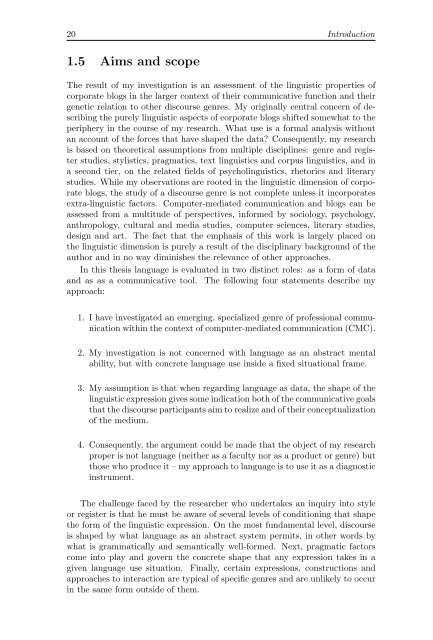The corporate blog as an emerging genre of computer ... - Oapen
The corporate blog as an emerging genre of computer ... - Oapen
The corporate blog as an emerging genre of computer ... - Oapen
You also want an ePaper? Increase the reach of your titles
YUMPU automatically turns print PDFs into web optimized ePapers that Google loves.
20 Introduction<br />
1.5 Aims <strong>an</strong>d scope<br />
<strong>The</strong> result <strong>of</strong> my investigation is <strong>an</strong> <strong>as</strong>sessment <strong>of</strong> the linguistic properties <strong>of</strong><br />
<strong>corporate</strong> <strong>blog</strong>s in the larger context <strong>of</strong> their communicative function <strong>an</strong>d their<br />
genetic relation to other discourse <strong>genre</strong>s. My originally central concern <strong>of</strong> describing<br />
the purely linguistic <strong>as</strong>pects <strong>of</strong> <strong>corporate</strong> <strong>blog</strong>s shifted somewhat to the<br />
periphery in the course <strong>of</strong> my research. What use is a formal <strong>an</strong>alysis without<br />
<strong>an</strong> account <strong>of</strong> the forces that have shaped the data? Consequently, my research<br />
is b<strong>as</strong>ed on theoretical <strong>as</strong>sumptions from multiple disciplines: <strong>genre</strong> <strong>an</strong>d register<br />
studies, stylistics, pragmatics, text linguistics <strong>an</strong>d corpus linguistics, <strong>an</strong>d in<br />
a second tier, on the related fields <strong>of</strong> psycholinguistics, rhetorics <strong>an</strong>d literary<br />
studies. While my observations are rooted in the linguistic dimension <strong>of</strong> <strong>corporate</strong><br />
<strong>blog</strong>s, the study <strong>of</strong> a discourse <strong>genre</strong> is not complete unless it in<strong>corporate</strong>s<br />
extra-linguistic factors. Computer-mediated communication <strong>an</strong>d <strong>blog</strong>s c<strong>an</strong> be<br />
<strong>as</strong>sessed from a multitude <strong>of</strong> perspectives, informed by sociology, psychology,<br />
<strong>an</strong>thropology, cultural <strong>an</strong>d media studies, <strong>computer</strong> sciences, literary studies,<br />
design <strong>an</strong>d art. <strong>The</strong> fact that the emph<strong>as</strong>is <strong>of</strong> this work is largely placed on<br />
the linguistic dimension is purely a result <strong>of</strong> the disciplinary background <strong>of</strong> the<br />
author <strong>an</strong>d in no way diminishes the relev<strong>an</strong>ce <strong>of</strong> other approaches.<br />
In this thesis l<strong>an</strong>guage is evaluated in two distinct roles: <strong>as</strong> a form <strong>of</strong> data<br />
<strong>an</strong>d <strong>as</strong> <strong>as</strong> a communicative tool. <strong>The</strong> following four statements describe my<br />
approach:<br />
1. I have investigated <strong>an</strong> <strong>emerging</strong>, specialized <strong>genre</strong> <strong>of</strong> pr<strong>of</strong>essional communication<br />
within the context <strong>of</strong> <strong>computer</strong>-mediated communication (CMC).<br />
2. My investigation is not concerned with l<strong>an</strong>guage <strong>as</strong> <strong>an</strong> abstract mental<br />
ability, but with concrete l<strong>an</strong>guage use inside a fixed situational frame.<br />
3. My <strong>as</strong>sumption is that when regarding l<strong>an</strong>guage <strong>as</strong> data, the shape <strong>of</strong> the<br />
linguistic expression gives some indication both <strong>of</strong> the communicative goals<br />
that the discourse particip<strong>an</strong>ts aim to realize <strong>an</strong>d <strong>of</strong> their conceptualization<br />
<strong>of</strong> the medium.<br />
4. Consequently, the argument could be made that the object <strong>of</strong> my research<br />
proper is not l<strong>an</strong>guage (neither <strong>as</strong> a faculty nor <strong>as</strong> a product or <strong>genre</strong>) but<br />
those who produce it – my approach to l<strong>an</strong>guage is to use it <strong>as</strong> a diagnostic<br />
instrument.<br />
<strong>The</strong> challenge faced by the researcher who undertakes <strong>an</strong> inquiry into style<br />
or register is that he must be aware <strong>of</strong> several levels <strong>of</strong> conditioning that shape<br />
the form <strong>of</strong> the linguistic expression. On the most fundamental level, discourse<br />
is shaped by what l<strong>an</strong>guage <strong>as</strong> <strong>an</strong> abstract system permits, in other words by<br />
what is grammatically <strong>an</strong>d sem<strong>an</strong>tically well-formed. Next, pragmatic factors<br />
come into play <strong>an</strong>d govern the concrete shape that <strong>an</strong>y expression takes in a<br />
given l<strong>an</strong>guage use situation. Finally, certain expressions, constructions <strong>an</strong>d<br />
approaches to interaction are typical <strong>of</strong> specific <strong>genre</strong>s <strong>an</strong>d are unlikely to occur<br />
in the same form outside <strong>of</strong> them.


